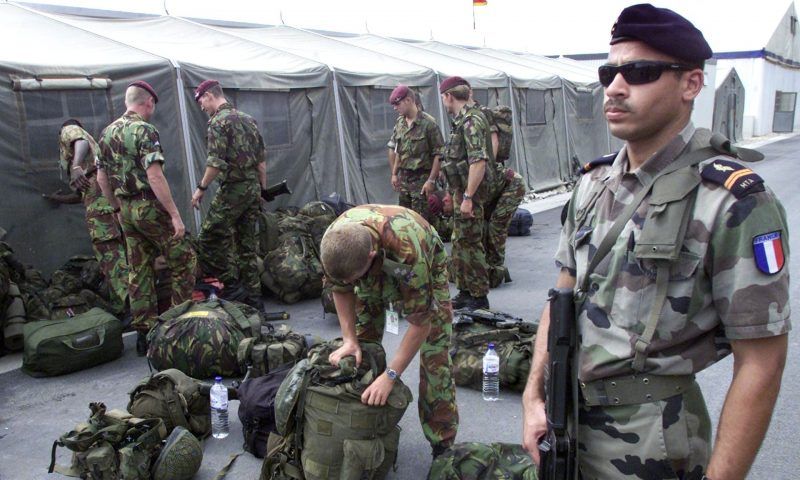
With the clock ticking and 29 March 2019 approaching ever closer, Brexit negotiations are entering their final, frantic stage. While the EU27 and Britain continue to disagree over the backstop in Northern Ireland, political disagreement within the UK has become the status quo. Amid all this, a crucial alliance at the heart of Europe is coming under increasing pressure.
The Franco-British alliance on defence and security has never been so valuable, as the threats we face are getting stronger: Islamist-inspired terrorism, Russia’s destabilising actions, state fragility in North Africa and the Middle East. All of this at a time when a new US foreign policy is heralding a world in which Europe will have to rely more on its own forces to defend itself.
Our alliance is fundamental to Europe’s security. Our two countries are the only true military powers on the continent: together they account for more than half of the European defence budget and capabilities. They are the only European countries with nuclear weapons, the only ones with both the political will and military means to engage in expeditionary operations, and the only ones willing to show leadership on the global stage in line with their responsibilities as permanent members of the United Nations security council.
Our alliance is old – we do not forget the entente cordiale of 1904, nor the fact that we fought together for Europe’s freedom during the two world wars. The Lancaster House treaties, signed in 2010, aimed to give it a new impetus. Since then, France and the UK have embarked on an ambitious programme of operational, industrial and nuclear cooperation – with many successes.
We established a combined joint expeditionary force, aimed at increasing successful military operation. We have fought side by side in Libya and the Levant. Officer exchange programmes have helped to break down barriers between the services. In the nuclear field, our two countries have set up joint simulation and research infrastructures, crucial for the viability of our nuclear deterrence. The success of this cooperation, in an area so sensitive and so closely linked to issues of national sovereignty, shows the strength of our relationship.
But today, our alliance seems fragile. Even before Brexit, certain aspects were unsatisfactory, but the UK’s withdrawal from the EU exacerbates these tensions. It threatens security cooperation, much of which is achieved through EU and multilateral European mechanisms, and risks complicating ties between British and French businesses that are crucial for industrial collaboration. Above all, it raises questions about our shared goals and ambitions.
So while the case for cooperation may be obvious, strong ties do not maintain themselves. As with all relationships, it is one that needs to be nourished and looked after. This is why we have been working with a range of experts, brought together by the Policy Institute at King’s College London and Institut Montaigne, to review the “health” of UK-France defence and security relations since the 2010 treaties. Proud of what has already been accomplished, while also acknowledging where we have fallen short, we have taken stock of this partnership and looked at how it could be strengthened.
We have identified three priorities. The first is to meet the challenges set by Brexit and ensure that it does not endanger the security of Europe. The second is to implement fully all aspects of the Lancaster House treaties. The third is for France and the UK to not only strengthen current areas of cooperation, but also put in place new mechanisms to tackle future challenges together.
We see three areas as being of particular importance: cybersecurity, intelligence-sharing and defence engagement.
Both our countries have recently been targeted by cyber-attacks. And while preventing such attacks is a growing area of concern for many states, measures to achieve this are omitted from the Lancaster House treaties. The treaties need to be complemented with a pillar on cybersecurity. As part of this, a taskforce should be established to explore ways of working more closely together in this area, and a joint doctrine should be developed for how to respond to cyber threats.
Bilateral intelligence sharing, while regular and deep, works largely on an informal basis. Although trust and personal relationships are imperative, they are not a substitute for more structured and formal relations. As a result, we propose complementing the Lancaster House treaties with a discrete agreement on this issue.
Finally, often under-appreciated – despite their potentially high impact – are defence engagement activities, ie military activities short of active combat, such as joint training exercises and military officer exchange programmes. Developing and finding new modes for delivering such activities is a low-cost yet effective way of deepening the UK-France partnership and continuing to exert a positive influence across the world, while at the same time showing the value of cooperation to other countries.
These are just a few of the areas we see as instrumental to our countries’ national security that can be enhanced through cooperation.
The responsibilities we have exercised in our previous roles have shown us that only political will can overcome the inevitable tensions of the Franco-British partnership. We need more will to protect and reinvigorate it. As we commemorate the end of the first world war, the Franco-British alliance remains as relevant as ever for the security of Europe.
Bernard Cazeneuve is a former prime minister of France; George Robertson was UK defence minister from 1997 to 1999, and Nato general secretary from 1999 to 2004.
